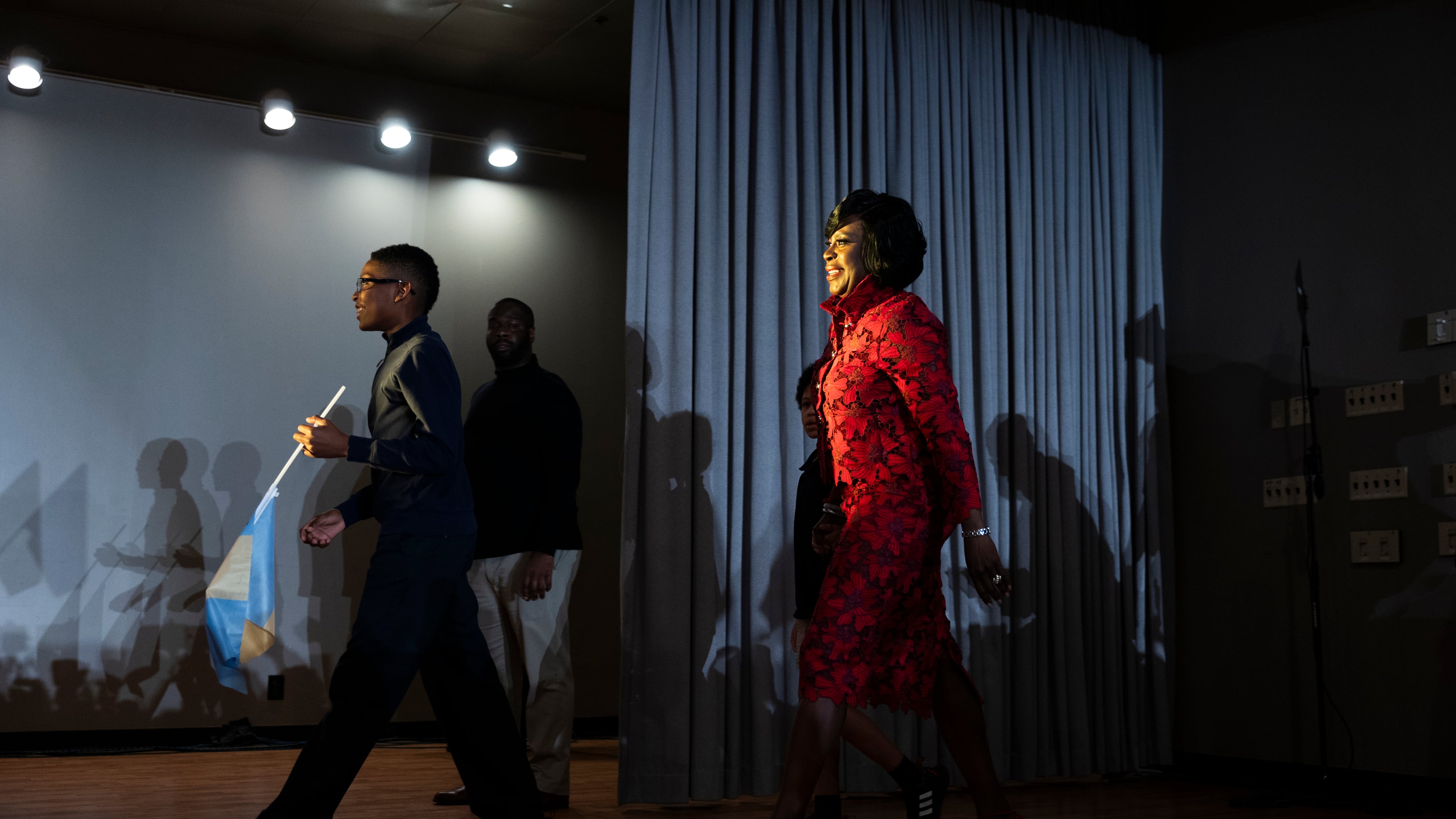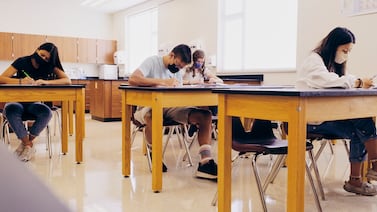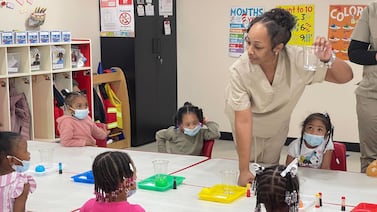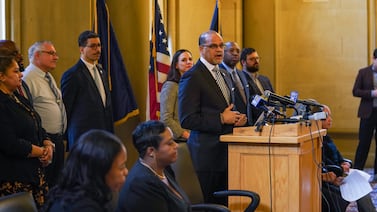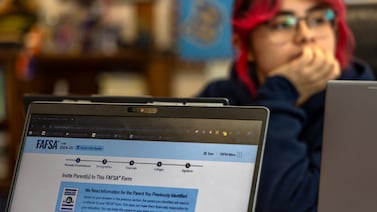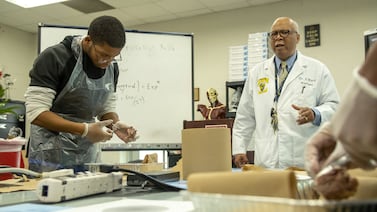Sign up for Chalkbeat Philadelphia’s free newsletter to keep up with the city’s public school system.
Philadelphia Mayor Cherelle Parker’s self-described “big” and “bold” first budget would increase funding for public schools, include a pilot plan for year-round learning, and create a new workforce pipeline program in the Community College of Philadelphia.
But despite ample city coffers due to post-pandemic years of unusually strong revenue collections, the proposal — and accompanying five-year financial plan — still relies on state funding to make up the district’s anticipated $400 million shortfall for the next fiscal year.
This is Parker’s first budget and the blueprint for how Philadelphia’s 100th mayor — and first woman to hold the job — intends to run the city. While shored up by temporary federal pandemic funding for the past few years, the underfunded school district is facing a $407 million gap for fiscal 2025, aging buildings, a gun violence epidemic that injured 10 students last week and killed one, a mandate to make up lost special education services for thousands of students, significant charter school costs, and teacher shortages.
Parker said her budget would increase city funding for the district, with a current budget of $4.5 billion, by $24 million in fiscal 2025. That would come partly from increasing the school district’s share of property tax revenue from 55% to 56%, which would bring in an additional $18 million. The district also gets revenue from other local sources, including an annual city grant which this year amounted to $282 million.
Parker said she also wants to increase the local contribution to the school district by $2 million each year going forward, and announced a plan to speed up the sale of delinquent tax properties, which she said would also raise more funds for the district.
Her budget proposal would bring the total to nearly $140 million in additional city funds for education over five years, the mayor said, with $129 million going directly to the school district and $10 million to a new workforce program at the Community College of Philadelphia.
Parker also doubled down on her year-round schools proposal and promised to pilot the initiative in schools starting this fall.
“On public education, our goals are high — they must be,” Parker said during her budget address to City Council on Thursday. “For far too long, our students have struggled with far too little. The days of settling for crumbs are over. Our students deserve a full loaf and they’ll get it.”
As Parker gets ready to name a new Board of Education, she signaled her support for Superintendent Tony Watlington, who was in attendance on Thursday. She told him, “You’re my guy.”
Become a Chalkbeat sponsor
Watlington and Board of Education President Reginald Streater issued their own statements in support of Parker’s proposal following her address.
Year-round school, city workforce pipeline, and more: what’s in the budget for schools
The mayor’s major education platform during the campaign was for year-round school and a longer school day, which will be expensive and undoubtedly require union negotiation. She never put a price tag on the proposal, but both she and Watlington came out in favor of a pilot to test the concept.
Parker said her budget includes a “plan for full-day and year-round schooling — offering students educational enrichment throughout the year, with schedules that work for working families.” She said her office of education will launch the initiative in 20 pilot schools this fall.
But she did not give a dollar amount during her address Thursday.
Parker also spoke passionately about the impact gun violence has had on Philadelphia students and families. She said the recent spate of shootings at SEPTA bus stops after school dismissal has “left our city shaken.”
“Enough is enough,” Parker said.
The budget includes $33 million in new investments in public safety for fiscal 2025, increasing the total amount to more than $600 million over five years.
She said she wants to hire 400 new police officers every year and fund 100 officers doing primarily “community policing.” She also wants to add new patrol cars, unmarked cars, video software, cameras at parks and recreation sites, drones, and upgrades to investigative equipment.
Parker also said youth safety is tied to opportunities outside of the classroom which is why she proposed $3.2 million for youth sports
“I know youth sports aren’t just about wins and losses — they’re about giving children hope,” Parker said. “”We should be supporting them.”
Become a Chalkbeat sponsor
For postsecondary education, Parker announced $10 million for the Community College of Philadelphia in partnership with the school district to “establish a first-in-the-nation City College for Municipal Employment” — a city workforce pipeline she said will prepare more students for jobs in city government. Participants will “earn a stipend while they learn and graduate into good city jobs” Parker said.
What the budget leaves out
The mayor’s plan to increase the district’s share of property tax revenue to 56% is significant, but won’t entirely solve the district’s looming shortfall. Parker had said during her campaign that she would like to see a larger share of city property tax revenue go to the school district, mentioning 58% as a goal.
Rob Dubow, the city Finance Director, said at a press briefing on Wednesday that they decided to shift the tax revenue split to 56% rather than 58% because the administration is moving “in concert” with what Gov. Josh Shapiro has proposed and what district officials said they needed in their budget presentation before the school board.
Last month, Shapiro proposed a state budget that would increase overall education spending by $1.1 billion, of which nearly $300 million in additional funds would come to Philadelphia. The city’s school costs are primarily covered by the state and the city; last year the state provided 46% and the city 41%, with federal money – mostly pandemic relief funds – making up the rest. Usually, the federal share is much smaller.
Parker cited the 2022 court ruling that Pennsylvania’s education funding system is unconstitutional and the finding by a legislative commission that Philadelphia alone needs $1.4 billion in additional state funds to meet the needs of all its students.
On the district’s aging facilities, Parker said “we need to modernize our existing schools and build new ones,” saying she would be “working with our allies on City Council” including Education Committee Chair Isaiah Thomas. Thomas has proposed creating an independent authority to handle school construction and renovation, but Parker did not comment on that proposal Thursday.
The primary education initiatives of her predecessor, Jim Kenney, were PHLPreK and the city investment in community schools, which bring social service resources and personnel into school buildings.
Dubow said PHLPre-K would be funded at the same level as last year. Under Kenney, PHLPreK served 17,000 students over several years, providing about 5,000 seats at any one time, and he regarded it as one of his biggest legacies.
Carly Sitrin is the bureau chief for Chalkbeat Philadelphia. Contact Carly at csitrin@chalkbeat.org.
Dale Mezzacappa is a senior writer for Chalkbeat Philadelphia, where she covers K-12 schools and early childhood education in Philadelphia. Contact Dale at dmezzacappa@chalkbeat.org.
